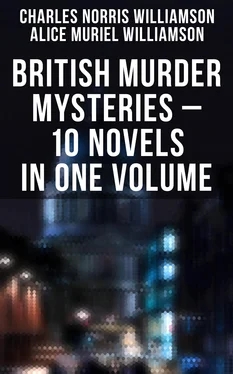He would wonder perhaps, when the blow fell, and say to himself, "Can Madalena have done this?" She must so act that his answer would be, "No. It's an accident of fate." Knight was not the sort of man who for a mere wandering suspicion, without an atom of proof, would pull a woman down. And there would be no proof.
"You are not kind," was the only response she ventured. "And you are not just. I did not want to 'scratch.' I would not injure you for the world, even if I could. Yet it does hurt to think our friendship in the past has meant nothing to you, when it has meant so much to me. It hurts. But I must bear it. I shall not trouble you about my feelings again."
If she had hoped that her meekness might make him relent she was disappointed. He merely said, "Very good. We'll go back to where we were."
That same evening Madalena wrote to Ruthven Smith. She took pains to disguise her handwriting, and not satisfied with that precaution, went out in a taxi and posted the letter in Hampstead.
It was a short letter, and it had no signature; but it made an impression on Ruthven Smith.
Chapter XVI.
Why Ruthven Smith Went
Table of Contents
Never in his life had Ruthven Smith been blessed or cursed by an anonymous letter. He did not know what to make of it, or how to treat it. Instead of exciting him, as it might had he been a man of mercurial temperament, it irritated him intensely.
That was the way when things out of the ordinary happened to Ruthven Smith: he resented them. He was not—and recognized the fact that he was not—the type of man to whom things ought to happen. It was only one strange streak of the artistic in his nature which made him a marvellous judge of jewels, and attracted adventures to come near him.
He was constitutionally timid. He was conventional, and prim in his thoughts of life and all he desired it to give. He was a creature of a past generation; and whenever in time he had chanced to exist he would always have lagged a generation behind. But there was that one colourful streak which somehow, as if by a mistake in creation, had shot a narrow rainbow vein through his drab soul, like a glittering opal in gray-brown rock.
He loved jewels. He had known all about them by instinct even before he knew by painstaking research. He could judge jewels and recognize them under any disguise of cutting. He could do this better than almost any one in the world, and he could do nothing else well; therefore it was preordained that he should find his present position with some such firm as the Van Vrecks; and, being in it, adventures were bound to come.
Many attempts to rob him had doubtless been made. One had lately succeeded. His nerves were in a wretched state. He was "jumpy" by day as well as night; and sometimes, when at his worst, he even felt for five minutes at a time that he had better hand in his resignation to the firm who had employed him for nearly twenty years, and retire into private life, like a harried mouse into its hole.
But that was only when he was at his very worst. Deep down within him he was aware that, while the breath of life and his inscrutable genius were together in him, he could not, would not, resign.
It was part of Ruthven Smith, an intimate part of him, not to be able to decide for a long time what to do when he was confronted with one of those emergencies unsuited to his temperament. He was afraid of doing the wrong thing, yet was too reserved to consult any one. He generally counted on blundering through somehow; and so it was in the matter of the anonymous letter.
He had heard, and dimly believed, that it was morally wrong, and, still worse, quite bad form, to take notice of anonymous letters. But this one must be different, it seemed to him, from any other which anybody had ever received. Duty to his employers and duty to the one thing he really loved was above any other duty; and for fear of losing forever an immense, an unhoped-for advantage, which might possibly be gained, he dared not ignore the letter.
At all events, he had told himself, no matter what he might decide later, it was just as well that he had accepted the invitation to Valley House. Perhaps someone—he could not think who—was playing a stupid practical joke, with the object of getting him there. But he would risk that and go, and let his conduct shape itself according to developments.
For instance, if his eyes were able to detect the small detail mysteriously mentioned in the letter, he would feel bound to act as it suggested; yes, bound to act—but how unpleasant it would be!
And the worst of the whole unpalatable affair was that if he did act in that suggested way, and if he accomplished what he might, with dreadful deftness, be supposed to accomplish, it would be the moment when perhaps he might be fooled.
If the letter were written by a practical joker, he would be made to look ridiculous in the eyes of all who were in the secret. And that thought brought him back to the question which over and over he asked in his mind. Who could have written the anonymous letter?
It must be someone acquainted with him, or with his profession; someone who knew the Nelson Smiths and the Annesley-Setons well enough to be aware that there was to be an Easter party at Valley House. The writer hinted in vague terms that he was a private detective aware of certain things, yet so placed that he could have no handling of the affair, except from a distance, and through another person. He pretended a disinterested desire to serve Ruthven Smith, and signed himself, "A Well Wisher"; but the nervous recipient of the advice felt that his correspondent was quite likely to be of the class opposed to detectives.
What if there were some scheme for a robbery on a vast scale at Valley House, and this letter were part of the scheme? What if the band of thieves supposed to be "working" lately in London should try to make him a cat's paw in bringing off their big haul?
This was a terrifying idea, and more feasible than the one suggested by the anonymous writer, that Mrs. Nelson Smith should—oh, certainly it seemed the wildest nonsense!
Still, there was his duty to the Van Vrecks. They must be considered ahead of everything! So Ruthven Smith, nervous as a rabbit who has lost its warren, travelled down to Devonshire on Saturday afternoon, invited to stay at Valley House till Tuesday.
It was as Knight had said: the dull, deaf man was as completely out of the picture in that house party as an owl among peacocks; for he was an inarticulate person and could not talk interestingly even on his own subject, jewels. His idea of conversation with women was a discussion of the weather, contrasting that of England with that of America, or perhaps touching upon politics. He was afraid of questions about jewels lest he should allow himself to be pumped, and the information he might inadvertently give away be somehow "used."
But he was by birth and education a gentleman; and his relationship to Archdeacon Smith, whom everybody liked, was a passport to people's kindness.
Duchesses and countesses were of no particular interest to Ruthven Smith, but their adornments were fascinating. At Valley House one duchess and several countesses were assembled for the Easter party, and they were women whose jewels were famous. Most of these were family heirlooms, but their present owners had had the things reset, and no queen of fairyland or musical comedy could have owned more becoming or exquisitely designed tiaras, crowns, necklaces, earrings, dog-collars, brooches, bracelets, and rings than these great ladies.
For this reason the ladies themselves were interesting to Ruthven Smith, and he might have been equally so to them if he would have told them picturesquely all he knew about the history of their wonderful diamonds, pearls, emeralds, and rubies. It was too bad that he wouldn't, for there was not a famous jewel in England or Europe of which Ruthven Smith had not every ancient scandal in connection with it at his tongue's end.
Читать дальше












